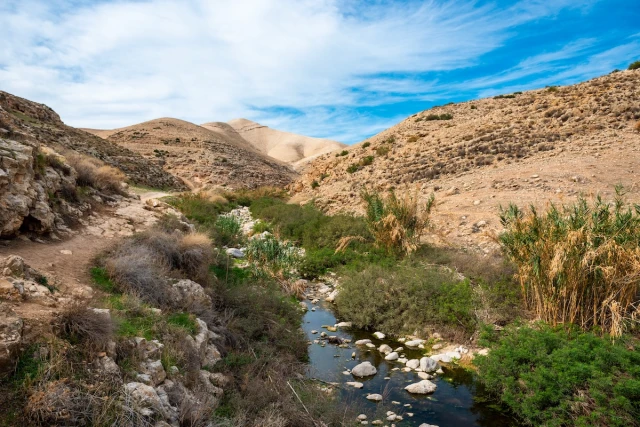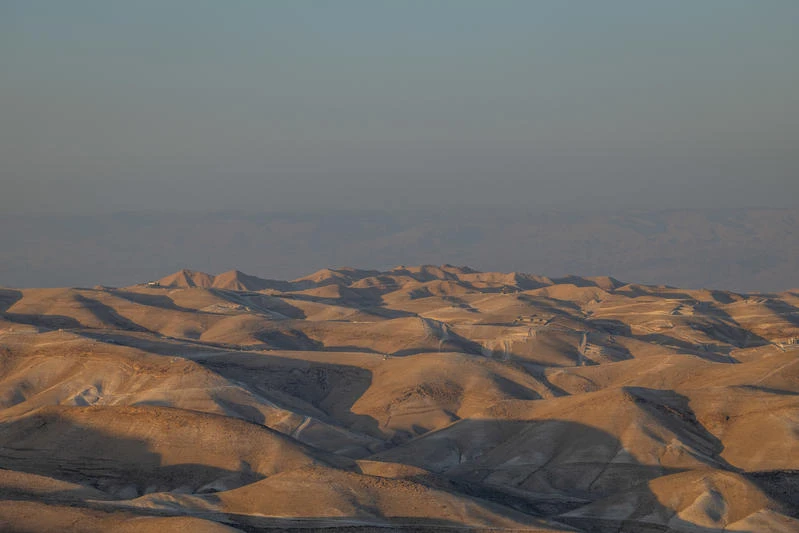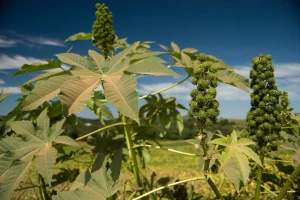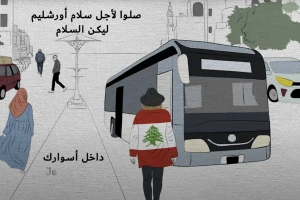Exploring Israel: How ancient prophets lived off-grid in the desert

The deserts of Israel have seen a lot of action. Many biblical stories took place in the wilderness, and it’s a profound experience to explore the terrain where godly heroes such as Elijah, Moses, and Jesus walked before us.
ALL ISRAEL NEWS correspondent, Oriel Moran, joins Levi Simon from Discover Israel to explore the sights and experiences to be found in the Judean desert.
Nahal Prat, on the northern border of the Judean desert, has the most valuable resource of all: water. As a result, there is also a variety of vegetation which can sustain life.
Pointing out an echinops plant, Simon draws attention to its natural defense mechanism: “The classic one is spikes to make sure that mountain goats and deer don't eat it,” he explains. Showing a small, edible part hidden inside the spiky globe, he continues, “It's normally ready during May or June, July, and you could actually eat this little ball on the inside. If you collect yourself ten of them, it'll supply half a lunch for you! It tastes a little bit like celery, very basic.”
Due to the soft rock limestone topography, caves have been carved out over time among the hills and valleys. Today some of these caves are used for sheep and goats.
“Historically, and even today, people live inside of these caves. It's a constant temperature the whole time. You have natural security. You could put a gate in the front,” Simon explained, “so prophets like Elijah, when he was looking for refuge, came into valleys like this.”
Beside the stream of Nahal Prat grows another plant that is used by desert dwellers: a minty leaf with a beautiful smell which the local Bedouin make into a very strong tea.
“It's a little bit bitter, so they put copious amounts of sugar in it, but it's definitely a very healthy plant to drink (as a) tea – it reduces inflammation, it's good for your stomach,” Simon informs, adding that the seeds and flowers need to be removed so it doesn’t taste too bitter.
Another plant to forage in the wilderness is the “Salaf” bush which produces capers. “You can eat all parts of it throughout the year,” Simon told Moran. “It sprouts twice a year… You have to brine it just like olives. You put it inside of a container, you put a little bit of oregano in, some lime, some water, some salt and you put these fruit in. Leave it for about a month and it will be an abundance of sustenance fruit here inside of the desert.”
Nearby stands the remains of a Roman aqueduct, built 2,000 years ago by King Herod, who channeled precious water from Nahal Prat towards Jericho.
“Whoever controls the water of that city controls the people of the city that can charge taxes. That was the central element of the water,” Simon explained. “This was guarded by militant soldiers. The… penalty for stealing water from the Roman army was the death penalty. It was so severe and they had to control and make sure they kept the water because this was all of their power.”
Later, around the time of the fourth century, monks started to settle in the desert, choosing an ascetic lifestyle in order to get closer to God.
“Sometimes the hardest challenge is to just sit by yourself with your own thoughts – silence around you with no simulation” Simon suggests. “You're forced to look inwards, and this is the goal of these specific monks who would sit in these caves by themselves… They would seclude themselves and sit here for months just really trying to reflect on what they see on their souls inside themselves. And that was their service to God.”
“Just sitting here you can feel the presence of God,” Moran agrees. Interestingly, the Hebrew word for desert has exactly the same root letters as the verb “to speak.” The still, small voice of God still speaks to those who choose to come to the desert and listen.

Is All Israel News’ faith-based reporting important to you? Be part of it—help us continue by becoming a $5/month supporting partner.

Jo Elizabeth has a great interest in politics and cultural developments, studying Social Policy for her first degree and gaining a Masters in Jewish Philosophy from Haifa University, but she loves to write about the Bible and its primary subject, the God of Israel. As a writer, Jo spends her time between the UK and Jerusalem, Israel.
You might also like to read this:











